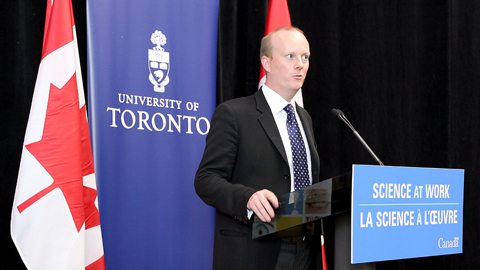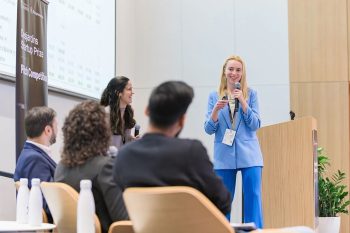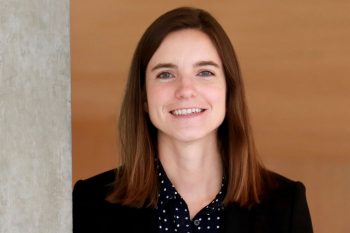U of T Engineering are among the many who will benefit from today’s announcement by the Government of Canada and the Natural Sciences and Engineering Council of Canada (NSERC) of $43 million in research and scholarship investment at the University of Toronto.
The funding will support 176 research projects and 186 students at U of T.
“Our government’s top priority is jobs, growth and long-term prosperity. To remain at the forefront of the global economy, our government is investing in the people and ideas that will produce tomorrow’s breatkthroughs,” said Gary Goodyear, federal minister of state for science and technology. “Through these investments, we are creating the best-educated and most skilled workforce in the world.”
Goodyear made the announcement at an event held in U of T Engineering’s Galbraith Building.
Universities across the country will receive more than $410 million in grants and scholarships over terms ranging from one to five years. These awards comprise the 2012 competition results for NSERC’s Discovery Grants, Discovery Accelerator Supplements, Alexander Graham Bell Canada Graduate Scholarships, NSERC Postgraduate Scholarships and Postdoctoral Fellowships.
“We are grateful to the Government of Canada and NSERC for this magnificent investment in our research community and our students,” said Professor Peter Lewis, associate vice president, research at U of T. “This funding will go directly to work that will have a tangible impact on areas that are of vital importance to global society.”
Among the recipients are nine U of T Engineering professors who received Discovery Accelerator Supplements, which are awarded to accelerate progress and maximize the impact of superior research programs. The award is valued at $120,000 over three years ($40,000 annually) and provides recipients with additional resources to compete with the best in the world. These resources may be used to expand the recipient’s research group (i.e., students, postdoctoral fellows, technicians), to purchase, or to have access to, specialized equipment, or for other initiatives/resources that would accelerate the progress of their research program.
One of the recipients is Professor Ted Sargent of The Edward S. Rogers Sr. Department of Electrical & Computer Engineering (ECE). Sargent received a Discovery Grant and a Discovery Accelerator Supplement to explore ways of harvesting solar energy. While solar power is abundant, clean and free, it is not easy to harvest inexpensively and efficiently. Sargent’s research will build low-cost, high-efficiency novel devices to help advance solar cell performance.
The other U of T Engineering recipients of the Discovery Accelerator Supplements are:
- Miriam Diamond (Geography/ChemE) who is researching emissions, fate, exposure and management of chemical contaminants indoors, outdoors and globally;
- Ashvin Goel (ECE) who is researching end-to-end data reliability with runtime verification;
- Giovanni Grasselli (CivE) who is researching the influence of rock micro-scale properties and material heterogeneity on rock engineering modelling;
- Axel Guenther (MIE) who is researching fluidic microprocessors for material assembly;
- Andreas Moshovos (ECE) who is researching next generation heterogeneous computer device architectures;
- Adam Steinberg (UTIAS) who is researching high-repetition-rate laser diagnostics experiments for prediction and control of thermo-acoustic instabilities in low-emission gas turbine engines;
- Ning Yan (Forestry/ChemE) who is researching value-added chemicals and other bio-based products from bark; and,
- Wei Yu (ECE) who is researching interference mitigation and network topology optimization for cooperative wireless cellular systems.
“Through these programs, NSERC provides direct support to an exceptionally strong base of scientific and creative talent in every field of the natural sciences and engineering,” said NSERC President Dr. Suzanne Fortier. “Our scholarships and fellowships programs help us recruit and retain the bright young minds that will lead the next generation of Canadian discoverers and innovators. The flexibility and broad base of research supported by our internationally recognized Discovery Grants Program maintains our capacity to promote important breakthroughs.”
An integral component of Canada’s support for research and training excellence at Canadian universities, the Discovery Grants Program funds ongoing programs of research in every scientific and engineering discipline. Of the 2,161 recipients across the country, 125 have been identified to receive a Discovery Accelerator Supplement, in addition to their Discovery Grant. Valued at $120,000 over three years, Discovery Accelerator Supplements are awarded to researchers whose research proposals suggest and explore high-risk, novel or potentially transformative concepts and lines of inquiry, and are likely to have impact by contributing to groundbreaking advances in the proposed areas of research.
Overall, 1,599 new NSERC scholarships and fellowships have been offered this year—consisting of the Alexander Graham Bell Canada Graduate Scholarships, NSERC Postgraduate Scholarships and Postdoctoral Fellowships. The funding announced today offers support at the master’s, doctoral and postdoctoral levels.
For the lists of recipients and descriptions of projects, visit NSERC’s website.



